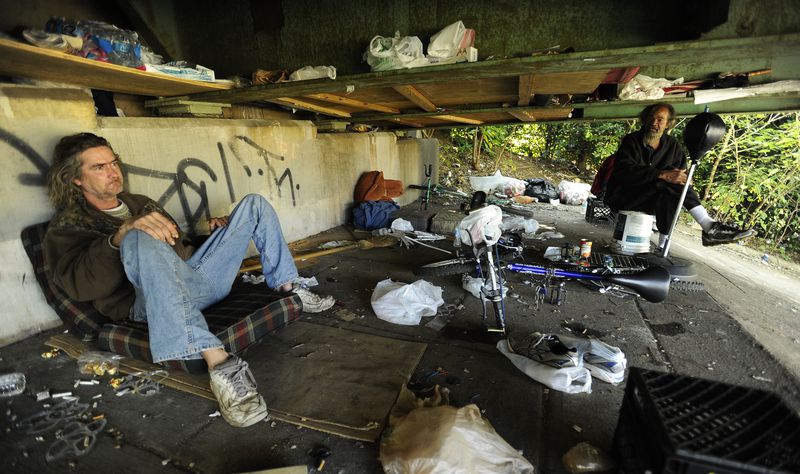By Ralph Chapoco and Alabama Reflector
Gov. Kay Ivey has signed a bill into law that would subject people to jail time if they get arrested for loitering multiple times.
HB 24, sponsored by Rep. Reed Ingram, R-Pike Road, was signed by Ivey on May 24. The bill, which began as an anti-panhandling measure, makes a first arrest for loitering a violation, but makes a second or subsequent arrest a Class C misdemeanor, punishable by up to three months in jail and a $500 fine.
The bill adds loitering in a public roadway to a list of loitering offenses, which include loitering for the purpose of begging; for gambling; for soliciting or engaging in prostitution, or for unlawfully using or possessing a drug.
“It is a safety thing,” Ingram said. “It is not about homelessness at all. It is about protecting anybody that is on the street, a state highway with 60 mile-per-hour speed limits.”
The new law has drawn criticism from civil rights groups who say it is a way of working around a recent federal court ruling striking down the state’s anti-panhandling laws.
“The sponsor is attempting to create a new crime that would allow law enforcement officers to arrest or cite people who are standing on the street asking for help without running headlong into that injunction,” said Micah West, senior staff attorney for the Southern Poverty Law Center’s Economic Justice Project, which challenged the anti-panhandling laws in court.
The bill emerged from an ongoing controversy over Montgomery’s approach to loitering and panhandling.
In 2019, the Montgomery City Council passed an ordinance that would have subjected people arrested for panhandling to jail time. The ordinance drew criticism, and it was later repealed.
That same year, three homeless individuals, represented by the SPLC, the National Homelessness Law Center and the ACLU sued the city in federal court, arguing state law violated the rights of people to solicit money under the First Amendment. U.S. District Judge Keith Watkins declared the state’s panhandling laws unconstitutional in March.
West argued the amended version of the bill defies precedent, such Broughton v. Brewer, a 1969 federal case where Alabama’s vagrancy laws were struck down for vagueness.
“What does it mean to loiter?” West said. “Does that mean that officers can ticket you when your car breaks down and you are standing on the side of the road? Or you have a flat tire, and you are trying to hail a taxi.”
As filed, the bill struck a portion of the law banning loitering for begging, replacing it with a ban on loitering in a roadway. But the final version of the bill that passed restored the anti-begging provision while keeping the ban on loitering in the streets.
“I added it back in,” Ingram said. “That was on the advice of the Attorney General and our Legislative Service upstairs, it was just constitutional, and to add it in there. There is litigation pending with the AG’s office, I think. That is the reason they wanted it and our attorneys here would rather have had it back in. That is the reason we added it.”
Messages sent to the Attorney General were not immediately returned.
Ingram said there are five to six instances of people colliding with vehicles.
“Most of them were either people who shouldn’t have been on the interstate obviously because no car was involved, they were not broken down or anything,” Ingram said. “I don’t know if they were living on the street or what. The street is no place to live. I mean it is dangerous. It is designed for automobiles.”
According to the Alabama Department of Transportation, 97 pedestrians were killed in traffic collisions in 2020. DOT said 62% of all fatal pedestrian crashes were caused by pedestrians. The DOT did not break down how many were related to panhandling.
“What that report tells us, one of the greatest reasons why pedestrians are killed is because of people being distracted by their smartphones,” West said. “Other reasons are drug or alcohol use by the driver or the driver is speeding. If public safety is the actual concern, legislators may be trying to address the wrong problem.”
Proponents could also argue that the fatalities may not have happened if a pedestrian is not there in the first place, but courts have consistently ruled that standing on the side of the road, holding a sign asking for financial assistance, is a constitutionally protected free speech activity subject to greater scrutiny.
The bill allows law enforcement to give those who could be arrested for loitering for begging transportation to emergency housing.
“An officer has an option, if you read the bill, to take them to a shelter or wherever they need to be, whether it is mental health or what,” Ingram said. “If they say they are homeless, they will take them to a shelter.”
But the bill says a law enforcement officer “may” make the offer and does not require it. In addition, the offer is not required for other loitering offenses listed in the bill, including being in a public roadway.
“Even though the sponsor is saying, ‘we have created this new offense, but we are trying to help people,’ it is not requiring that an officer arrest someone for loitering because that exception is attached to something else that has been enjoined that no one can enforce,” West said.
Shelter space could also be an issue, but Ingram said he believes local services could keep up.
“We have got a new mental health shelter in Montgomery,” Ingram said. “I know the Salvation Army, they are in transition now, but they are putting them in hotels. You can’t count that they don’t have that. They do have that option and they are giving vouchers for them.”
West said that introducing new laws into the books, creating new crimes that penalize people who are homeless, does not address public safety.
“If legislators are actually concerned about the health and safety of our unhoused community, what research tells us is that we need to address our affordable housing crisis and build more affordable housing,” West said. “There is no evidence that arresting those individuals improves public safety, reduces traffic fatalities, or that even holding a sign while on the side of the road is a safety concern.”











